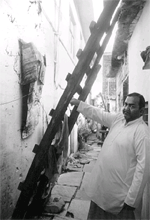Fiery protest
Fiery protest

the morning of September 3, 1999, changed the sleepy locality of Sainik Nagar, situated in the outskirts of Bhopal, Madhya Pradesh, forever. Kanhaiyalal, a 46-year-old resident, tried to immolate himself demanding the closure of polluting industries in the area. His family members and the local police arrived on time to scuttle his bid.
This suicide bid was the last resort to protest against the polluting industrial units situated in the locality. These factories recycle and manufacture pvc shoes. There are 10 such factories, two of which have closed down. Ironically, these factories are owned by Kanhaiyalal's cousins.
"The factory owners used muscle-power and political support to carry on production despite opposition from local residents. They also bribed the local pollution control board authorities to flout all norms,' claims Kanhaiyalal. Despite protests, Kanhaiyalal's cousins started constructing another factory beside the existing one. "The license, the no objection certificate ( noc ) and all the other necessary documents were completed,' he says. Kanhaiyalal and his neighbours complained but to no avail.
Pollution-related diseases are common in the area. "My father died of tuberculosis ( tb ) and my daughter has some strange disease,' says Kanhaiyalal. Another seven-year-old girl has tb . Respiratory diseases and cardiac ailments have also plagued the residents of the area. "I cannot walk even for a while now. I lose breath,' says Kanhaiyalal.
"I went to the commissioner, the district magistrate, the collector and the police, and when my pleas went unheard, I filed a case. But they (his cousins) bribed the lawyer to turn him against me,' says Kanhaiyalal. "The municipal officials came here with bulldozers. And instead of closing the factories, they tried to bulldoze my shop,' says Kanhaiyalal. Though this was prevented, the actual culprits went scot-free.
The factory owners were later called to the municipal office. But again no action was taken. It was then that Kanhaiyalal and some of his neighbours gave the authorities an ultimatum of 20 days and threatened to go on a hungerstrike. "I also threatened to immolate myself if no action was taken,' says Kanhaiyalal.
The locality boasts of a pollution control authority office, an industrial department and a municipal office. But these departments are inactive, says Kanhaiyalal, adding, "All the eight factories here are organised. And when the pollution control officials come for a check, they leave the factories with pockets filled with money.' According to Kanhaiyalal, all the factories shell out at least Rs 3,000 per month as bribes.
Kanhaiyalal wants the factories closed because of jealousy, says Prakash Khubjanani, one of the cousins and owner of two sealed factories. He alleges that even Kanhaiyalal had installed a machine to manufacture pvc shoes, an allegation that Kanhaiyalal acknowledges. "Our father disapproved of it due to the pollution. Later, we sold it off,' he says. However, Khubjanani does not acknowledge the pollution theory. "If the factory is so bad, all the people here should have died by now,' he says. However, neighbours claim that some of the factory workers have died because of tb and other diseases.







